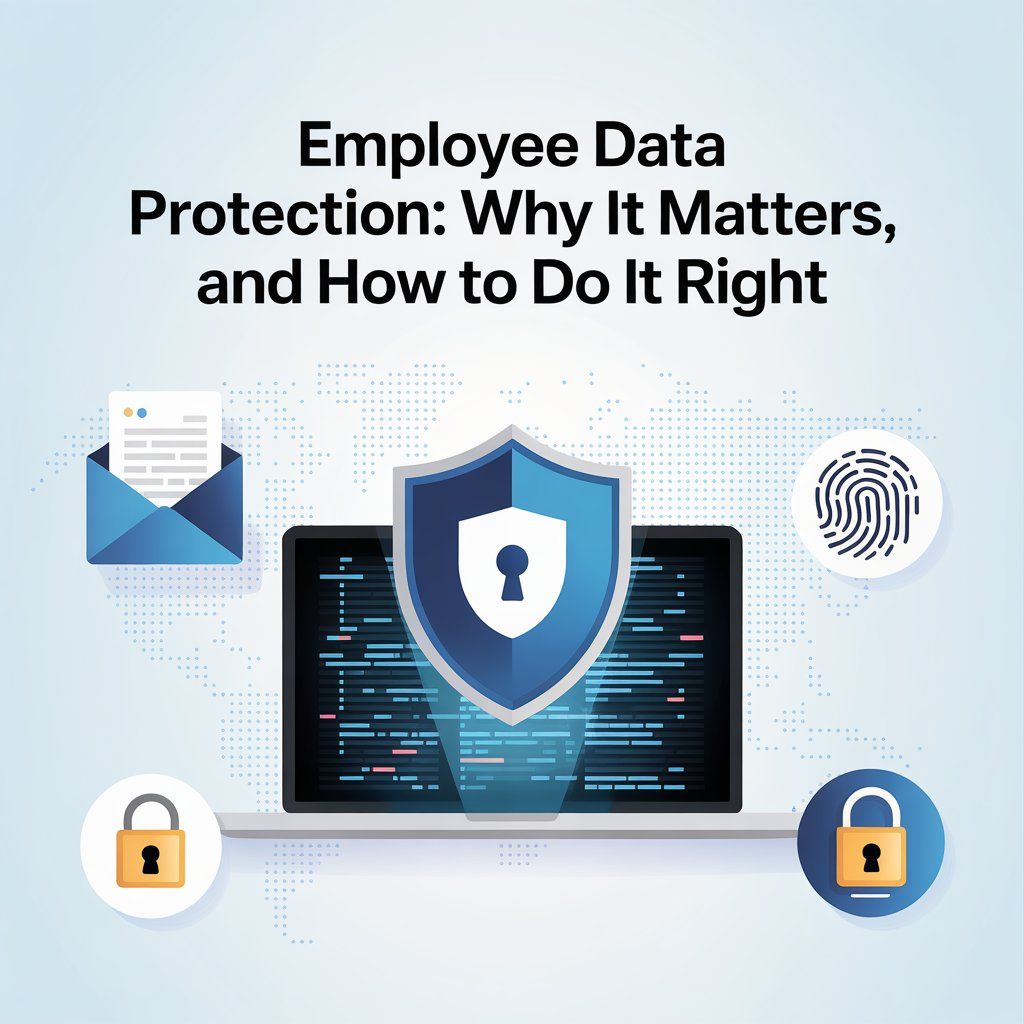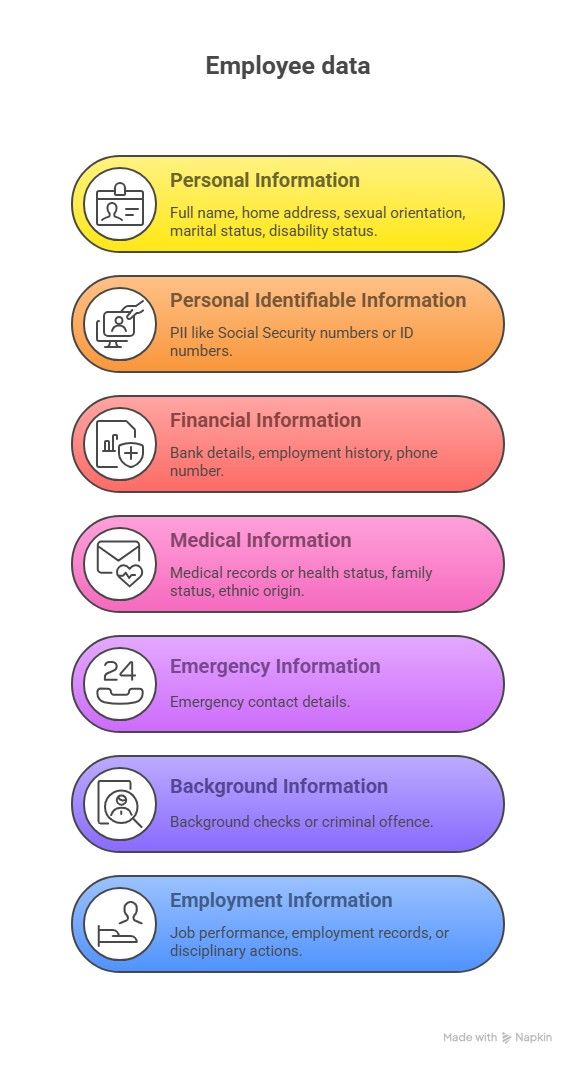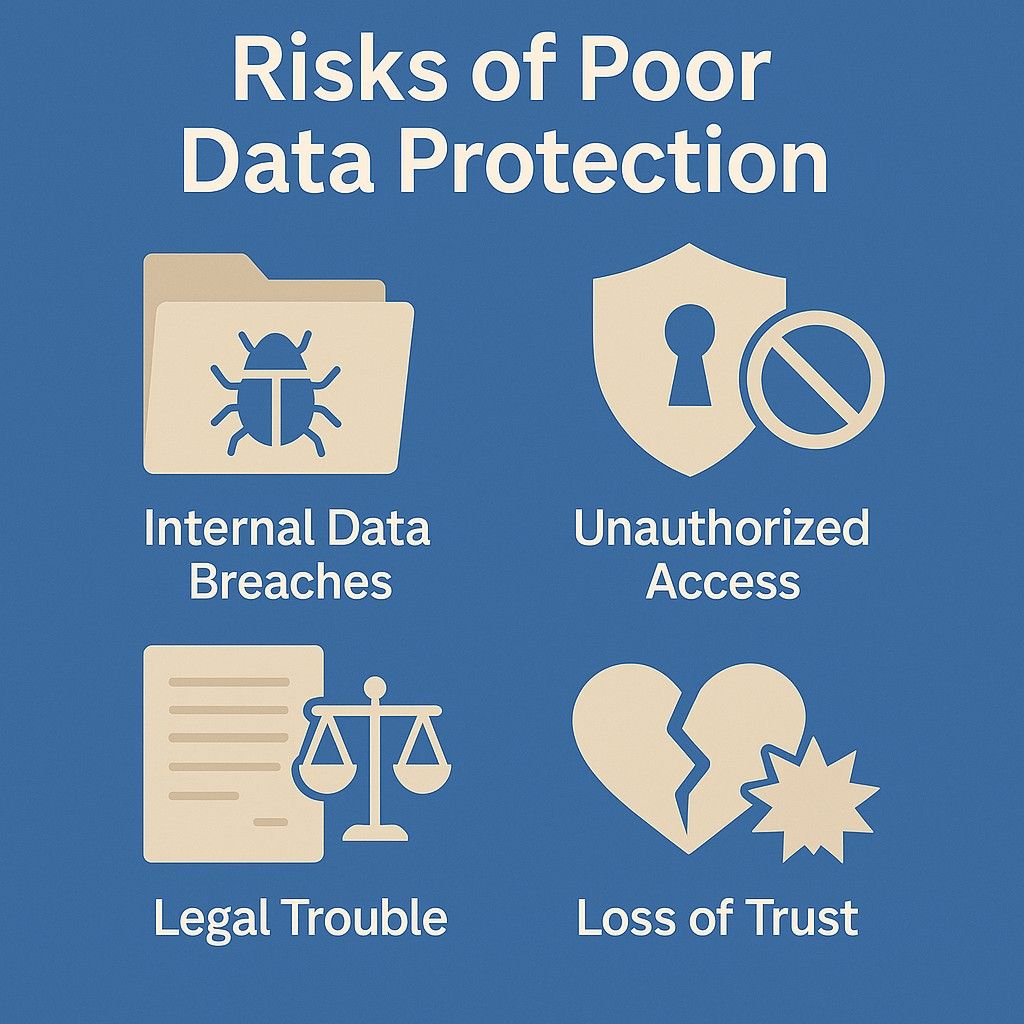Employee Data Protection: Why It Matters, and How to Do It Right

Summary:
-
Employee data includes employees’ sensitive personal information.
-
When employee data is leaked, it can cause identity theft, legal trouble, stress, and loss of trust.
-
Global data privacy laws protect employees and make employers accountable.
-
To protect employee data, save only the necessary data, limit access, train staff, use safe tools, and follow privacy laws.
In 2013, Yahoo had one of the most significant data breaches ever. It affected billions of people and exposed employee information.
And a few years later, in 2017, Equifax had a major breach, putting millions at potential risk. The case was settled for $425 million.
These events reveal how vulnerable your data is!
Even big, well-known companies aren’t safe when protecting data.
That’s why keeping employee data safe is more important than ever.
When personal information is leaked, it affects individual rights. It can cause stress and harm your finances, health, and peace of mind.
In this article:
- Definition of Employee Data Protection
- Global Data Protection Laws Explained
- Problems with Poor Employee Data Protection
- Practical Steps for Employee Data Security
What is Employee Data Protection?
Employee data protection means keeping your employees' personal information safe and private. This includes name, home address, phone number, medical history, etc.
Employers can collect personal information through the company's employment terms and conditions. This data might be used for payroll, health insurance, or performance reviews.
But because it contains sensitive employee data, it needs to be handled carefully and stored securely.
Companies must encrypt data, limit instant access, and ensure privacy policies. Only the right people should have access to this information.
What Counts as Employee Personal Data?
A company collects many personal details about job applicants while hiring.

This can include:
- Full name, home address, sexual orientation, marital status, disability status
- Personal Identifiable Information (PII) like Social Security numbers or ID numbers
- Bank details, employment history, phone number
- Medical records or health status, family status, ethnic origin
- Emergency contact details
- Background checks or criminal offence
- Job performance, employment records, or disciplinary actions
This information helps the company run its HR and payroll systems.
If any of it gets leaked or misused, it can hurt the employees and the company. So, it must also be handled carefully.
Why it matters in today’s data-driven environment
Today, most companies use digital tools to manage their employees. Whether for hiring, payroll, health benefits, or daily communication, personal information about many employees is stored in computers, cloud systems, and apps.
Some companies even track employees with work monitoring software that also collects significant online data.
With so much data shared and stored online, the legal risk of being exposed or stolen is higher than ever.
In fact, the global average cost of a data breach reached $4.88 million in 2024. And 63% of organizations face data breaches because employees misuse mobile devices.
Cyberattacks, accidental leaks, or even human error can lead to serious problems.
Therefore, protecting employee data is essential. It shows your employees that you respect their privacy rights and take their security seriously. It also helps your company follow important laws and avoid costly penalties.
In short, the more digital our workplaces become, the more crucial it is to keep employee information safe.
Protect your team’s data while tracking their time
Main Employee Data Privacy Laws by State and Other Countries
Different regions have different data privacy regulations. Your safety depends on where you work, your employment contracts, and what kind of data your employer keeps.
Here's a breakdown of key employee data protection policies.
The U.S.
The U.S. doesn’t have one central data privacy law. Rather, it has several federal and state laws to protect employee data.
Most state laws have a similar base, but you may find a few differences.
Federal Laws
The Electronic Communications Privacy Act (ECPA)
ECPA is a federal law in the U.S. It saves private communications, including phone calls, emails, text messages, electronic monitoring, and online data. The law ensures that data is secure while being transmitted and after being stored on computers or servers.
The Americans with Disabilities Act (ADA)
ADA prohibits discrimination against individuals with disabilities in the workplace. It ensures the confidentiality of disability information.
The Health Insurance Portability and Accountability Act (HIPAA)
HIPAA is a federal law that protects health information. It applies to health plans, hospitals, clinics, business partners, and medical data organizations.
HIPAA has specific rules for the storage and disclosure of employees' health data.
- Employers cannot access an employee’s health records unless necessary.
- Health information must be securely stored, with strict access controls.
- Employees must provide written consent before sharing their health data.
- Employees have the right to view their health records and request amendments.
Fair Credit Reporting Act (FCRA)
The Fair Credit Reporting Act (FCRA) is a U.S. law that controls how employers run background checks on job seekers and employees. It ensures that personal data is accurate, private, and used fairly in hiring, promotions, and job decisions. Employers must store these reports securely.
U.S. State Privacy Laws
Each state in America has its own rules to protect people’s data.
Some states, like California, have strong laws covering employee information, while others are still catching up.
For companies, it means they need to be careful and stay updated, because the rules can change depending on where their employees live or work.
- California Consumer Privacy Act (CCPA) / California Privacy Rights Act (CPRA) – California
- Colorado Privacy Act (CPA) – Colorado
- Connecticut Data Privacy Act (CTDPA) – Connecticut
- Utah Consumer Privacy Act (UCPA) – Utah
- Virginia Consumer Data Protection Act (VCDPA) – Virginia
- Texas Data Privacy and Security Act (TDPSA) – Texas
- Oregon Consumer Privacy Act – Oregon
- Florida Digital Bill of Rights – Florida
- Montana Consumer Data Privacy Act – Montana
- Delaware Personal Data Privacy Act – Delaware
Federal vs. State Regulations Explained
PIPL – Personal Information Protection Law (China)
PIPL is one of the strictest privacy laws in the world. It’s like China’s version of the GDPR.
This law says that companies must clearly explain why they're collecting data and get the person’s consent. If you handle employee data in China, you must be careful, ask permission, and be transparent about your actions.
European Union
The General Data Protection Regulation (GDPR)
GDPR provides strict rules and security to protect privacy. It plays a vital role in the world's privacy policy and sets a baseline for others.
The basics of GDPR rules for employee data privacy:
- Be lawful, fair, and transparent
- Use data only for its intended purpose
- Data minimization
- Make it accurate
- Don't keep data forever
- Protect it
- Be accountable
United Kingdom
The UK GDPR (General Data Protection Regulation) and the Data Protection Act 2018 are key regulations.
UK General Data Protection Regulation (UK GDPR)
After Brexit, the UK adopted most of the EU GDPR rules under the UK GDPR. The UK has more possibilities to change its GDPR rules in the future.
Data transfers between the UK and the EU are still permitted.
However, the UK may need to revise its policies to ensure compliance with the EU.
Data Protection Act 2018
The Data Protection Act 2018 (DPA 2018) is the UK's primary legislation for data privacy. It outlines specific guidelines for employers on managing employee personal data and supporting data security.
LGPD – General Data Protection Law (Brazil)
LGPD is a national law of Brazil that works to fulfill the expectations of privacy of natural persons. Employers must also be transparent and honest with their workers about how and why their data is being used.
Brazilian law gives employees real control over their personal information and expects employers to protect it.
POPIA – Protection of Personal Information Act (South Africa)
POPIA is all about giving people more say over their personal information.
For employees, this means their boss can’t just collect, share, or use their data without a good reason. Employers must get consent, explain what they’re doing with the data, and make sure it stays private and secure.
Employee Data Protection Policy India
In India, employee data protection is governed by the Digital Personal Data Protection Act, 2023 (DPDP Act).
Like other laws, it creates a framework for employee rights and data protection.
Employers can process employee personal data without explicit consent when it is essential for employment purposes or to protect against loss or liability.
This act permits the transfer of personal data outside India, except to restricted countries.
Stay compliant while managing your workforce.
Risks of Poor Employee Data Protection

Internal Data Breaches
When employee data isn’t handled carefully, internal data breaches can occur. 95% of data breaches are caused by human error. A team member might accidentally send sensitive information to the wrong person, or someone might still have access to company systems after leaving the job.
Unauthorized Access
Another major issue is unauthorized access.
Almost 70% of organizations say their employees do not have basic security awareness. This happens due to a weak password, shared login, or poor system security.
It can lead to the misuse of personal information and spiral out of control before anyone notices.
Legal Trouble
Legal trouble is a huge risk, too.
Many countries have passed strict laws to protect people’s data. Ignoring those rules can be expensive. Companies can face big fines and government investigations if they mishandle employee information.
But beyond just money, there's the bigger cost of damaging the company’s reputation, which is much harder to recover from.
Trust Factor
If employees find out that their private data has been leaked or misused, it can shake their confidence in the company.
People want to feel safe at work.
But once that trust is broken, it can lead to lower morale, a negative work culture, and even people quitting.
If their information gets into the wrong hands, they might face identity theft, credit fraud, or even health insurance abuse.
What is HR's Role in Protecting Employee Data?
Collect Only What’s Needed and Be Clear About It
Before collecting any information from employees, ask for consent from employees. The less data you collect, the less you have to protect. This is called data minimization, and it’s one of the best ways to reduce legal risk.
So, be transparent and open.
Let employees know what data you’re collecting, why you need it, how long you’ll keep it, and who it’s shared with. Run internal audits regularly.
Lock It Down
Personal data is more valuable than money. It needs to be locked up.
Data encryption can keep it safe.
Also, make sure the employee documents are stored somewhere safe. Use secure systems, and back up all data in case of a crash or mistake.
Not Everyone Needs to See Everything
The access control mechanism is needed. Only give access to people who truly need it. If someone doesn’t need employee health records or salary information to do their job, they shouldn’t have access to it.
Also, limit the unauthorised access. Keep a record of who opens or edits sensitive data. These audit trails help spot problems early and show you’re responsible.
Follow Employee Data Privacy Laws
You have already seen that many countries have laws to balance employee privacy and company access.
And if you don’t follow these laws, your company could face fines, lawsuits, or worse.
But more than that, it could damage your reputation with employees.
So, arrange the employment context within the legal standards. Also, ensure the legal obligations when cross-border employee data transfers.
Teach Your Team
Employee training is significant, especially for recognizing scams, malware, and cyber threats.
Train them regularly to protect themselves, create strong passwords, and handle data responsibly. Make this training easy and regular.
A quick reminder can go a long way in building a strong security culture.
Use the Right Software for the Job
Not all tools are safe. Look for features like built-in encryption, role-based permissions, secure cloud storage, and compliance tracking.
Invest in the right HR software, payroll systems, or compliance platforms for automated decision-making. The right software automates protection, so you’re not relying on memory or manual processing.
Also, you can introduce ethical workplace monitoring. It will give you transparency in personal data processing.
A great tool will catch problems before they happen and show you where to improve.
Employee Monitoring Ethics: What’s Legal, Fair, and What’s Not
Conclusion
Taking care of employee data is about more than just following the law. It’s about building trust and looking out for your team's well-being.
Whether you’re a business owner, an HR professional, or an IT manager, you need to ensure the legal basis that employee data remains private and secure.
This involves adhering to legal requirements, utilizing the right tools, and fostering a workplace culture that values privacy. Behind every piece of data is a real person who relies on you to act responsibly.
Start with small steps. Stay updated with international data protection standards, and take security measures.
Overall, make protection obligations a core part of your leadership.

